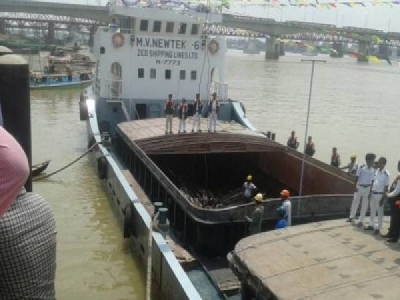
Posted on July 4, 2017
The reported Indian proposal seeking Bangladesh to meet 20 per cent of the cost for dredging the routes of its two major rivers under the Protocol of Inland Water Transit and Trade (PIWTT) does not seem to be fair. India, according to a report published recently in this paper, has floated a proposal to amend the relevant clause of the PIWTT under which it has been paying Tk.100 million to Bangladesh to keep the route navigable. In fact, India in its own interest has been paying the route-maintenance charges to Bangladesh. The river transit facility is very important for India and the routes proposed to be dredged are mainly used by it to carry goods to its land-locked northeastern states.
The use of river routes for transporting goods to India is not favoured by the Bangladesh businesses, for the land routes are far less time-consuming and economical for them. Fly-ash is the only item that is being imported from India using these two river routes. Yet the need for ensuring greater connectivity with the neighbours through both land and river routes is undeniable for the sake of bringing the peoples of the two countries closer and strengthening economic and political ties. But, while doing so, the relevant countries can hardly overlook their individual interest. The granting of transit facility by one country to a neighbour to have access to the latter’s landlocked parts and also to other countries is an international practice. But no country offers such a facility without some fees and charges. This is an area where there are some sour feelings in Bangladesh.
The Bangladesh Inland Water Transport Authority (BIWTA), which is responsible for keeping all the river routes navigable, now gets a ridiculous amount of Tk. 10 out Tk.192 for transiting a tonne of Indian cargo through river routes. Initially, an expert committee had suggested levying of Tk.1058 as fee for transiting a tonne of Indian cargo. But after a lot of foot-dragging, India agreed to pay Tk.192 in November 2015. Thus, the proposal that would require the BIWTA to spend 20 per cent of the cost involved in dredging Ashuganj-Zakiganj stretch of the Kushiyara River and Sirajganj-Daikhawa stretch of the Jamuna River does not sound reasonable. Had the transit fees and charges been adequate, India could have asked Bangladesh to keep the river routes in question navigable at its own cost.
That there are some hurt feelings about the Indian position towards Bangladesh in matters of bilateral trade and trade with neighbours like Nepal and Bhutan can hardly be denied. Businesses here have been repeatedly complaining about non-tariff barriers of different forms by the Indian authorities. The Indian government lately has been trying to be more accommodative and helpful in boosting Bangladesh’s export to India. But the fact is Indian state structure itself often works as a barrier to the execution of many positive moves of the central government. Yet if the central government is determined, it can get things done well. For the sake of healthy business relationship and meaningful connectivity, it is important to ensure a win-win situation for both Bangladesh and India.
Source: The Financial Express





